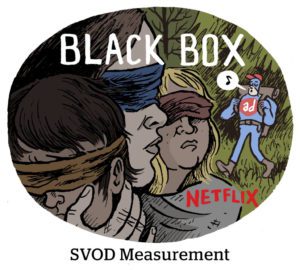 Nielsen went public with ratings for the Netflix hit film “Bird Box” on Tuesday, estimating that the blockbuster (so to speak) attracted 26 million US viewers in its first week.
Nielsen went public with ratings for the Netflix hit film “Bird Box” on Tuesday, estimating that the blockbuster (so to speak) attracted 26 million US viewers in its first week.
But wait, didn’t Netflix say 45 million accounts watched “Bird Box” in the first seven days?
Netflix rarely discloses specific viewership numbers for any content, so it raised eyebrows last month when the streaming leader tweeted that more than 45 million accounts watched “Bird Box” in its opening week. Netflix later clarified that it only counted viewers who watched 70% or more of the film. Netflix’s numbers are also global, whereas Nielsen is looking at US viewership.
Netflix did not respond to request for comment.
Nielsen’s streaming video on demand (SVOD) ratings come from a subset of its National TV panel, though it doesn’t disclose what percent of the panel opts in to SVOD tracking.
Netflix has previously disputed Nielsen’s streaming ratings, and the numbers are in fact disputable because of Nielsen’s unclear methodology, its US-only coverage and the company’s reliance on panel-based data. Nielsen extrapolates from a relatively small group to create a total audience number instead of actually logging 26 million views.
Regardless, there’s great thirst for solid streaming numbers. Although Netflix got kudos for using memes to reinvent movie marketing, media and advertising companies are scrutinizing Netflix engagement data because it has important implications for the industry.
Netflix didn’t market “Bird Box” the way a big entertainment company normally would by spending boatloads on billboards, TV commercials and YouTube. Instead, Netflix gave the film pride of place on its homepage for more than a week – and that’s a potential lesson for OTT device operators, like Amazon and Roku, or for TV-streaming services, such as AT&T’s DirecTV Now, Hulu Live and Sling TV. Viewers can be effectively influenced or directed to content when they turn on a streaming service.
Improved visibility into Netflix could also help inform news and entertainment partners as they set new licensing agreements. Netflix recently reupped its deal with AT&T’s WarnerMedia for rights to the TV show “Friends,” agreeing to pay $100 million in 2019, up from $30 million last year.
Producing a hit Netflix show can be lucrative, but because Netflix doesn’t usually disclose ratings, that makes it hard for even TV classics to understand their actual value. For instance, “Friends” is Netflix’s second most popular show, accounting for 4% of all views, according to data from Jumpshot, an analytics business that bases its Netflix ratings on a panel and only tracks audiences to the Netflix web site.
Jumpshot’s panel is smaller and more limited than Nielsen’s SVOD ratings, and neither will overlap exactly with Netflix’s internal results. But the value of the show “Friends” to Netflix didn’t triple from last year to now, which means WarnerMedia most likely had better data to work with.













